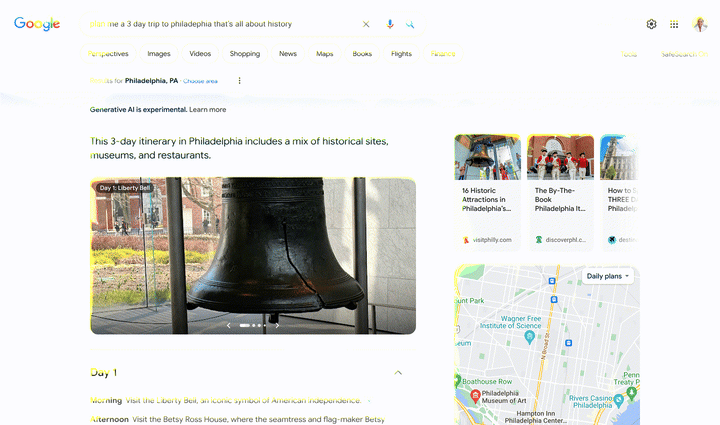Google tipped to start charging users for AI search results — here's what we know
It could be bundled with Google One

Google is rumored to be considering charging a fee to get access to its AI-powered search results in the future. This includes the ability to generate images and create trip itineraries.
The plan would be to put artificial intelligence generated search results behind a paywall or bundled with an existing subscription service like Google One.
The rumor, first published in the Financial Times, comes as Google faces increased competition from AI search startups including Perplexity and Glean in the enterprise search space.
Google told the FT it was “not working on or considering” an ad-free search but was continuing to build out new premium capabilities to “enhance our subscription offerings.”
How do AI search results work?

Google’s Search Generative Experience (SGE) uses a number of AI models to create answers and structured response to queries where a single website might not have the information.
It is currently only available as an opt-in, where users have to sign up for Google Search Labs and select the SGE experiment to see AI results at the top of a search query. However, Google is starting to roll it out to mainstream, non-opted in results for some U.S. users.
The AI results appear above the normal list of links and ads and can be completely different depending on the query. For example it could show a recipe if you ask how to make buffalo wings, or give you a day-by-day itinerary if you say you’re going to Madrid for a week.
Get instant access to breaking news, the hottest reviews, great deals and helpful tips.
Other companies are working in this same space and billion dollar startup Perplexity is actively trying to overtake Google by offering more nuanced and detailed results.
Why might Google want to charge for AI results?
Google already has an AI subscription service. Google One, previously reserved for extra Drive storage, now includes access to Gemini Advanced as well as Gemini in Workspace apps. Being able to also add Gemini in Search to that list would make it a more compelling proposition.
The company told the FT it has “nothing to announce right now” but that it has been reinventing search to help people access information in a natural way for years.
A spokesperson said: “With our generative AI experiments in Search, we’ve already served billions of queries, and we’re seeing positive Search query growth in all of our major markets. We’re continuing to rapidly improve the product to serve new user needs.”
According to the FT the work to charge for it has already been developed but executives are still deciding whether to deploy it or to what extent. There are likely concerns even hinting at charging could harm the cash cow search business.
More from Tom's Guide
- I put Google Search AI image generator to the test
- Apple could bring Google Gemini to the iPhone for AI
- Google's AI search tool just got a major upgrade

Ryan Morrison, a stalwart in the realm of tech journalism, possesses a sterling track record that spans over two decades, though he'd much rather let his insightful articles on AI and technology speak for him than engage in this self-aggrandising exercise. As the former AI Editor for Tom's Guide, Ryan wields his vast industry experience with a mix of scepticism and enthusiasm, unpacking the complexities of AI in a way that could almost make you forget about the impending robot takeover.
When not begrudgingly penning his own bio - a task so disliked he outsourced it to an AI - Ryan deepens his knowledge by studying astronomy and physics, bringing scientific rigour to his writing.
 Club Benefits
Club Benefits















